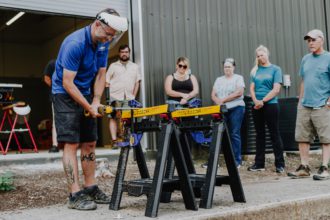By Shelby Harris, originally published by Carolina Public Press. Carolina Public Press is an independent, in-depth and investigative nonprofit news service for North Carolina.
Sparks fly off a small metal pipe as Corey Isbell presses an electric blade against it on a cloudy August night in Haywood County.
When a small piece of pipe clinks onto the ground, Isbell turns around, lifts the clear screen covering his face and says, “Who’s next?”
One by one, the adult students at Haywood Community College take the grinder and cut the pipe into pieces as Isbell, the director of the college’s construction program, looks on.
The eight students are the first to take HCC’s Introduction to Basic Construction Skills class, a nine-week course held at the Clyde campus that teaches the fundamentals of construction work.
The course, part of HCC’s workforce development program, was made possible in part with federal COVID-19 recovery money after the Haywood County Board of Commissioners voted in April to award the school $500,000 of its American Rescue Plan Act, also known as ARPA, funds.
Haywood County, with a population of about 63,000, is currently the only Western North Carolina county that has opted to use some of its ARPA money to support local community colleges. Altogether, the county will receive more than $12.1 million through ARPA, which will also be used to expand broadband access and pay staff salaries, according to the most recent plan approved by county commissioners in April.
“It was already in their awareness, and I think the opportunity to be able to support that project was really appealing to them,” HCC President Shelley White said.
Considering the ‘hot construction boom’
The COVID-19 pandemic ushered in a need for workforce development programs like HCC’s, which will offer courses in fields such as construction, plumbing, HVAC, electrical line work and truck driving — all supported in part by ARPA funding.
“One of the challenges with the community college system is being able to maintain programming during the economic ups and downs of certain industries,” White said, adding that the school previously had a construction program that fizzled out because of lack of interest.
“Now there’s a hot construction boom, and we’re needing to rebuild the capacity to train individuals to work in those fields, which are critical,” she said.
“So, we’ve kind of re-created the capacity to offer this training, but we’re doing it in a way that hopefully can be more sustainable as there’s changes within the industry.”
Classes like the introduction course, in which students learn how to use power tools, interpret construction drawings and safely handle materials, aren’t just available to people looking to get into the construction industry. Those who want to polish their skills or learn something new can take the introduction course that costs roughly $300 without scholarships or assistance.
Erin Boyd saw an advertisement for the new program while scrolling through Facebook a few months ago. She quickly called her mother, Patty, with whom she owns Hidden Hollow Designs, an interior design company in Haywood County. The two registered for the course together.
“We’ve obviously been buying tools, and we don’t use them properly, so this has been very educational,” Erin laughed, adding that hours before the Aug. 16 class, she had unknowingly used the wrong saw to cut metal. After one class, she now knows that a grinder would have been the proper tool for the job.
The mother-daughter pair hopes that as the class goes on, they’ll learn more about how to sustain their business and maintain the family’s rental properties — which Patty and Erin also manage — without having to outsource help.
“If we can get in there and do some of the work ourselves, it’ll keep the job going,” Patty said.
While the courses are intended to strengthen WNC’s existing construction industry and fill job vacancies in the field, there are also other objectives for the future of the workforce development program.
“(The program) is kind of skewed towards helping, among other populations, the justice-involved population,” Isbell said, adding that the program hopes to also attract formerly incarcerated people who may be looking for job skills.
“Our goal is to help folks who are justice involved get job skills, so that they can get into construction and, big picture, reduce recidivism and get people out of that cycle.”
More than $3 million going to county’s workforce development

In addition to the $500,000 provided through ARPA, the workforce development program is also receiving more than $2.6 million through the Golden LEAF Foundation and the N.C. Department of Labor.
These funds not only allowed Haywood Community College to begin the programs but also enabled the school to renovate the HCC satellite location in Waynesville, where the classes will be held.
White said most of the needed renovations to the satellite location — a 50-year-old warehouse-style building with large open rooms, tall ceilings and garage doors — are minor, such as refinishing the floor, painting the walls and ceilings, and updating the heating, ventilation and air-conditioning system.
And they’re well underway, thanks in part to county officials who deemed education as a top priority for the county’s $12.1 million ARPA funds, Haywood County Manager Bryant Morehead said.
How the WNC county made the investment happen
Education isn’t specifically highlighted as an acceptable ARPA expenditure, according to U.S. Treasury Department guidelines, but the county is able to fund some education initiatives with pandemic recovery money because Haywood officials claimed nearly all of its ARPA allotment as revenue loss, which is acceptable under Treasury guidelines.
When a government claims ARPA funds as revenue loss — which it can do regardless of whether there was an actual drop in revenue due to the pandemic — it’s able to move the money into its operating budget and use the funds, intended to strengthen communities in the wake of COVID-19, on essentially anything.
“For local governments, (claiming revenue loss) makes it a little easier to be in compliance so the feds don’t come back and ask for their money back,” Morehead said.
That’s why Haywood was able to set aside $1 million of its ARPA allotment for the community college and public school system. A specific $500,000 project earmarked for county schools has yet to be determined, but Morehead said the goal is to address some of the lost instructional time students faced because of the pandemic.




Before you comment
The comments section is here to provide a platform for civil dialogue on the issues we face together as a local community. Xpress is committed to offering this platform for all voices, but when the tone of the discussion gets nasty or strays off topic, we believe many people choose not to participate. Xpress editors are determined to moderate comments to ensure a constructive interchange is maintained. All comments judged not to be in keeping with the spirit of civil discourse will be removed and repeat violators will be banned. See here for our terms of service. Thank you for being part of this effort to promote respectful discussion.